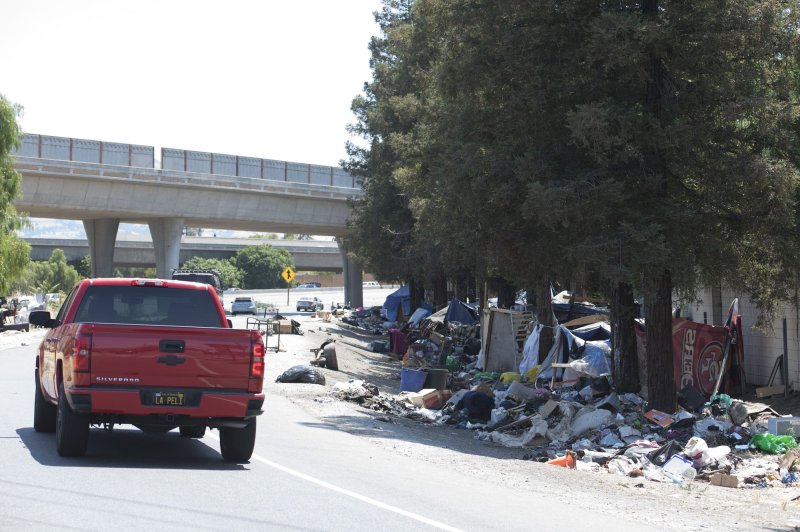Disability advocates have filed a lawsuit against California's new CARE Courts system arguing that though it is being billed as an answer to the state's homeless crisis, it will only burden unhoused residents with mental health issues with court hearings. File Photo by Terry Schmitt/UPI |
License Photo
Jan. 27 (UPI) -- Disability advocates in California have filed a lawsuit against Gov. Gavin Newsom's controversial new court system that could force people suffering from mental illness to submit to treatment in an effort to curb the state's homeless crisis.
The lawsuit filed Thursday in the California Supreme Court by Disability Rights California and other civil rights and disability advocates accuses the so-called CARE Court system of violating constitutional guarantees of due process and equal protection as well as the fundamental rights to privacy, autonomy and liberty.
Newsom, a Democrat, created the court system in September when he signed the Community Assistance Recovery and Empowerment Act into law, while describing it as "a paradigm shift" to help homeless Californians suffering from mental illness receive the care they need.
Under the CARE Act, families, clinicians, first responders and other authorized adults can petition the civil court to create a CARE health plan for a specific individual suffering from mental illness, such as schizophrenia, and order them to follow the plan for up to a year, which can then be extended another 12 months.
The court system, which is to begin rolling out in October, came under staunch criticism after it was first unveiled nearly a year ago, and the lawsuit on Thursday described it as a measure that will strip Californians with disabilities of fundamental constitutional and due process rights.
Disability Rights California argues that the system will bring Californians with disabilities into court whether their mental health condition is likely to deteriorate or relapse, which goes against legal standards that prohibit courts from speculating into a person's future mental health situation.
In the lawsuit, they state that the eligibility criteria for the program are vague, subjective and undefined and that under the act those "who are not presently a danger or gravely disabled can be forced into treatment if a court speculates that they are 'likely' to meet these criteria in the future."
Petitions filed against a person suffering from mental health issues will trigger a series of court hearings that may continue for years and coerce them to follow a CARE plan, restricting their autonomy in choosing their medical providers as well as where and with whom they live.
The CARE Act, the lawsuit states, violates the Equal Protection Clause of the state's constitution "because it singles out people with schizophrenia for burdensome court proceedings and coerced treatment not imposed on other similarly situated.
"No other California mental health statute distinguishes between individuals based on diagnosis, rather than severity of need," the lawsuit states. "The CARE Act's focus also perpetuates racial inequity, since Black people are disproportionately over-diagnosed and misdiagnosed with schizophrenia.
"No legitimate or compelling state interest justifies this classification," it said.
Newsom signed the law into being as his state combats a homeless crisis with state statistics showing that as of January 2020, 161,548 people experienced homelessness on any give night in California, representing nearly 30% of the nation's homeless population.
Disability Rights California rebukes the notion that CARE Courts will alleviate this problem, stating in the lawsuit that the measure "does not appropriate one penny towards building or preserving affordable housing. Nor does it increase access to mental healthcare facilities.
"Instead, the proposed solution is court orders that rob unhoused Californians of their autonomy to choose their own mental health treatment and housing and threatens their liberty," it said. "This 'solution' will not work and will deprive thousands of people of their constitutional rights."















